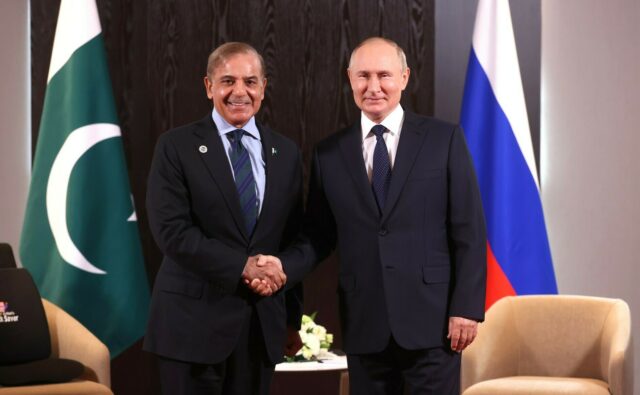
Putin Sees Pakistan as Russia’s Priority Partner in South Asia
Publication: Eurasia Daily Monitor Volume: 19 Issue: 147
By:

On September 15, Russian President Vladimir Putin, during a meeting with Pakistani Prime Minister Shehbaz Sharif on the sidelines of the Shanghai Cooperation Organization (SCO) summit in Uzbekistan, declared Pakistan as one of Moscow’s primary partners in South Asia. As the Russian leader put it, “I would like to note that we see Pakistan as a priority partner in South Asia as well as the continent as a whole. Relations between our countries are developing absolutely positively, and we are pleased about that” (Kremlin.ru, September 15).
Formerly Cold War rivals, Russia and Pakistan share a troubled history. During the Cold War, Pakistan was the front-line ally of the United States in its war against the defunct Soviet Union. Having leverage over the Afghan Mujahideen—the Taliban’s predecessor—Islamabad played a crucial role in the exit of Russians from Afghanistan.
It was only in 2011 that Islamabad extended a friendly hand to Moscow, after US-Pakistani relations seriously deteriorated following the killing of al Qaeda leader Osama bin Laden by US special forces inside Pakistan. Ties between Moscow and Islamabad have gradually improved over the past decade. In 2016, for the first time, both counties held joint exercises in Pakistan (Express Tribune, April 11).
Perhaps, the most consequential project that will strategically connect Russia with Pakistan is an energy pipeline supplying Russian gas to Islamabad. During his meeting with Sharif, Putin demonstrated a willingness to deliver gas to energy-starved Pakistan, as some infrastructure for this already exists in Russia, Kazakhstan and Uzbekistan (Geo TV, September 15).
In this light, Putin has offered to reactivate the Pakistan Stream gas pipeline, which was originally finalized in 2015 but has yet to become operational. Pakistan needs reliable energy supplies from Russia to fuel its industrial sector and for domestic use (Dawn.com, September 17).
In 2021, Islamabad and Moscow signed a revised deal for the construction of the $2.5 billion Pakistan Stream pipeline, also known as the North-South gas pipeline, which was designed to supply gas from the liquefied natural gas (LNG) terminals at the port cities of Karachi and Gwadar to the city of Lahore in Punjab province. This project will not only deepen Russia’s growing involvement in South Asia, but it will also strengthen Pakistan’s energy security (see EDM, August 3, 2021).
However, the main hurdle with most pipeline projects from Central to South Asia has been the rampant political instability in Afghanistan, through which most pipelines must traverse before entering Pakistan and beyond. For example, the Turkmenistan–Afghanistan–Pakistan–India (TAPI) gas pipeline has so far remained only a pipe dream, as the project could not be finished due to security concerns in Afghanistan. Thus, Putin sought Islamabad’s cooperation in settling the Afghan issue during his meeting with Sharif.
Today, the presence of terrorist groups in a post-US Afghanistan raises security concerns in both Moscow and Islamabad. A United Nations report warned that transnational terrorist groups, such as al Qaeda and the Islamic State, are growing in strength in Afghanistan (Dawn.com, July 21). Without a stable government in Kabul, it is difficult to check the expansion of such terrorist groups and their operations in the Central Asian republics and Russia (Express Tribune, April 20, 2021). In 2021, Russian Foreign Minister Sergey Lavrov visited Islamabad to relay that the Kremlin was open for any form of cooperation, from the construction of gas pipelines to defense cooperation (Express Tribune, April 11, 2021).
In the past, Afghanistan served as the battlefield for the Russian-Pakistani rivalry during the Cold War. The US-Pakistani strategic partnership during the 1980s against the Soviets in Afghanistan was instrumental in the breakup of the Soviet Union. Nevertheless, presently, that same Afghanistan could be the stage for rapprochement and a deepening of strategic ties between Moscow and Islamabad.
Moreover, the Kremlin views Pakistan as one of China’s closest ally and strategic partner. And for Islamabad, its road to Moscow actually goes through Beijing. On February 4, Putin attended the opening ceremony of the 2022 Winter Olympics in Beijing. The Russian leader was there to win China’s backing in Russia’s showdown with the US and its Western allies over Ukraine. Then-Pakistani Prime Minister Imran Khan also attended the ceremony to show solidarity with China and Russia amid the West’s boycott of the Olympic Games and position on Ukraine (Express Tribune, February 4).
Some observers even believe that China had actually arranged Khan’s visit to Moscow on February 24 when Russia re-invaded Ukraine. The visit, which raised eyebrows in the US, provided the Kremlin with an opportunity to impede India, Pakistan’s arch rival, from joining the West in condemning Russia’s re-invasion of Ukraine (Dawn.com, March 2).
Finally, Russia supports China’s Belt and Road Initiative (BRI) and has even demonstrated interest in joining the China-Pakistan Economic Corridor (CPEC), the BRI’s flagship project. Moscow’s interest in CPEC is a direct result of growing Russian-Pakistani relations over the past decade. In 2019, Moscow and Islamabad, during a meeting of the Pakistan-Russia Consultative Group on Strategic Stability, agreed to a proposed seven-point road map for boosting bilateral relations; Russian participation in CPEC was one of the seven priorities (Times of Islamabad, March 28, 2019). In November 2020, Russia, along with other SCO members, except India, fully supported CPEC in a joint communiqué issued at the end of the SCO council of heads of government in New Delhi (Hindustan Times, November 30, 2020).
Russia’s expected future participation in CPEC will further strengthen the Beijing-Moscow-Islamabad nexus and strategic partnership, thus expanding Moscow’s influence in South Asia. The Kremlin’s participation in CPEC will also open greater opportunities for China, Russia and Pakistan to enhance trilateral cooperation. If Russia formally joins CPEC, it would be a critical breakthrough in Moscow-Islamabad bilateral relations and open a gateway to opportunities and economic prospects for both countries (see EDM, August 3, 2021).



